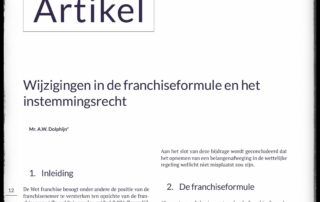Judge: “franchisee to move in standstill period” – mr. RCWL Albers – dated July 1, 2021
In recent proceedings before the preliminary relief judge in Utrecht, a franchisor in the pizza industry was sentenced to offer a franchise agreement and enter into a franchise relationship with a new franchisee. The franchisor had refused after nearly two years of negotiations because of a critical e-mail from the franchisee. The preliminary relief judge ruled that the franchisor was not free to do so, partly in view of the standstill period included in the Franchise Act.
The potential franchisee had already reported to the franchisor in July 2019 with the wish to operate a branch. As a result, a selection procedure was started and various interviews were held and documents were exchanged. Finally, a letter of intent was signed.
Now that the Franchise Act had now entered into force, the franchisor had to comply with the information obligations and standstill period contained therein. On May 11, 2021, the potential franchisee was provided with a pre-contractual information document (PID) of over 400 pages and a draft franchise agreement.
Criticism of the draft franchise agreement has been sent by the potential franchisee to the franchisor by e-mail. Based on this, the franchisor decides that it no longer wishes to cooperate with the potential franchisee.
The potential franchisee’s lawyer then summons the franchisor to still offer the franchise agreement. This is not complied with, the potential franchisee is therefore forced to start summary proceedings.
Assessment judge in preliminary relief proceedings
The preliminary relief judge rules as follows.
Pursuant to the letter of intent, the franchisor is obliged to offer the franchise agreement.
The franchisor has also done so by providing a PID with which it was offered to enter into a franchise relationship. The preliminary relief judge considered that the Franchise Act entails that the franchisor provides the necessary information on the basis of which the intended franchisee:
- can make a realistic assessment of the risks involved in entering into and performing the agreement;
- can assess whether, and to what extent, and under what conditions, if any, it is prepared to take on those risks.
For this purpose, the intended franchisee must be granted at least four weeks through the standstill period. This is a period for reflection.
According to the preliminary relief judge, these legal obligations include that the franchisor makes an offer to the intended franchisee. It is then up to the intended franchisee to consider whether he wants to accept this offer or whether he still wants to enter into negotiations. The franchisor can only wait during this period and must honor the offer during this period. It is the franchisee’s turn.
The preliminary relief judge therefore concludes that the franchisor was not allowed to withdraw the offer during the standstill period, but also that there was no valid reason to no longer allow that offer to apply.
The provision included in the PID by the franchisor that the provision of the PID does not oblige the franchise agreement to be entered into has been set aside by the court. The preliminary relief judge ruled that such a provision does not belong in a PID. In addition, the potential franchisee was asked to sign for receipt and not for approval. The court rules that it is therefore also unreasonable to hold the franchisee to this provision.
Conclusion
The franchisor’s other arguments were also of no avail and she was therefore sentenced to offer the franchise agreement and enter into the franchise relationship under penalty of a penalty.
In short, franchisors must ensure that offering a franchise agreement (as part of a PID) under the Franchise Act is not an optional matter. The starting point is that the franchisor may not withdraw the offer made with it during the standstill period and only the intended franchisee can decide to withdraw from this offer. A first important statement about the application of the standstill period included in the Franchise Act.
Ludwig & Van Dam lawyers, franchise legal advice.
Do you want to respond? Then email to albers@ludwigvandam.nl

Other messages
Mitigation of fine due to ‘dominant position’ of franchisor
Mitigation of fine due to 'dominant position' of franchisor ...
It is a non-competition clause at the end of the lease
In the judgment of 26 March 2024, ECLI:NL:GHSHE:2024:1035, the Court ...
Looking ahead: Bottlenecks at the end of the franchise agreement
Of course, everyone starts a collaboration with good courage. But ...
Not just a successful appeal to incorrect forecasts
Not just a successful appeal to incorrect forecasts Introduction ...
Changes to the franchise formula and the right of consent
An article by Mr. was published in the leading legal ...
The National Franchise podcast
Guests on the National Franchise podcast are: Theodoor Ludwig ...







